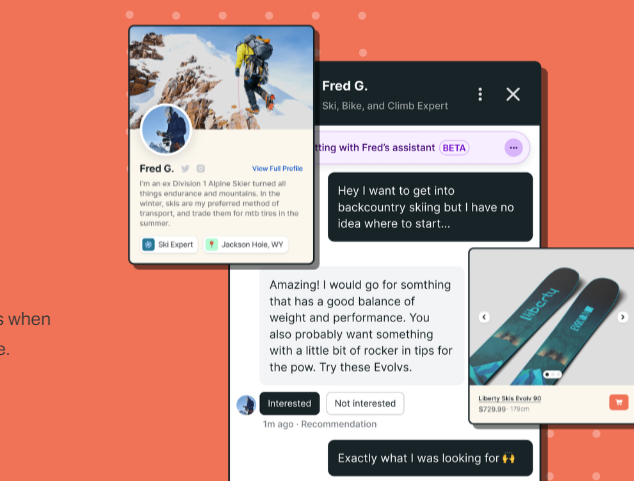Startup Remark offers assistance to shoppers struggling to choose the best products for them through the power of artificial intelligence.
Remark co-founder and CEO Theo Satloff said the two-year-old firm boosts confidence by connecting buyers with high-quality product professionals via asynchronous live chat, per TechCrunch. The platform allows performers, stylists, golfers, and other specialists may discuss products with shop employees.
By training AI models on these experts, Remark creates avatars that answer questions like humans. This ensures the availability of an “expert” even when they are not present.
Remark compensates human professionals with a platform sales percentage. Users of Remark may employ human knowledge, AI personas, and customer-targeted blog posts and landing pages.
Satloff, Ian Patterson, and Carl-Philip Majgaard envisioned Remark for expensive goods. However, they discovered that buying is emotional regardless of price, and people use Remark for almost every purchase, including socks.
After hundreds of thousands of Darn Tough Socks client encounters, Remark experts found that even low-cost items may be high-consideration, high-emotion purchases.
Remark caters to clients in the baby, beauty, skincare, and outdoor sectors. Satloff called the 9% customer revenue increase and 30% conversion rate “astounding.” He compares it to “brick-and-mortar” stores, where 30% of visitors buy.
Remark’s expert-assisted buying goes beyond AI-based algorithmic advice based on past purchases. The firm’s help with pre-sale decisions, while others provide post-sale support. With its own community, Remark can generate and adapt new data.
Read Also: Amazon’s Cloud Computing Arm AWS to Invest $17 Billion in Spain
Meanwhile, a Forbes article noted that AI integration and hyperpersonalization present business opportunities and challenges. It noted that AI provides individualized product suggestions and support to strengthen client connections.
The piece also cautioned that consumer satisfaction may not be sustainable as enterprises in the AI-driven market must consistently examine customer needs and enhance service quality to remain competent. However, it is important to note that surpassing expectations does not guarantee customer loyalty.
Moreover, as AI promotes personalized consumer experiences, privacy concerns are growing. Poorly handled business data that provides targeted experiences may infringe on privacy. Customers demand more data usage and security details.
Online Shopping Gets Boost from Remote Work
Separately, the Mastercard Economics Institute concluded that COVID-19 pandemic-related remote work boosted online use by $375 billion last year, per a CBS News report. According to the poll, internet spending increased in US zip codes with significant home-based employment. Locations with fewer remote jobs spent less online.
(Photo : Stuart C. Wilson/Getty Images for eBay)
An online shopper uses the eBay website on May 30 in London, England.
Nicholas Bloom, a labor economist and Stanford University professor of economics noted that remote work made online shopping simpler since employees could buy without coworkers seeing their laptops.
This trend has caught on worldwide. Online spending rose 4% in remote work countries and remained steady elsewhere.
As urbanites moved to suburbia in 2023, internet expenses rose. This shift from urban to suburban regions may have increased internet shopping, according to Mastercard Economics Institute head economist Michelle Meyer.
Working from home enables customers to pick up deliveries, decreasing theft concerns. Co-author and Kellogg School of Management assistant professor of finance Scott Baker discovered a “learning effect” among cautious online customers. These people started purchasing online during the pandemic and still do.
Related Article: Hands-free Help: Microsoft and Truecaller Developing AI Call Assistant for Users
ⓒ 2024 TECHTIMES.com All rights reserved. Do not reproduce without permission.

